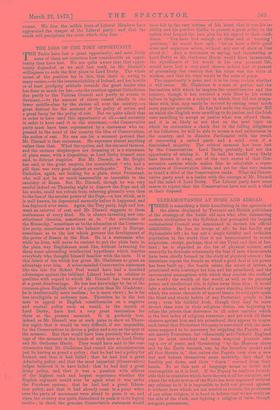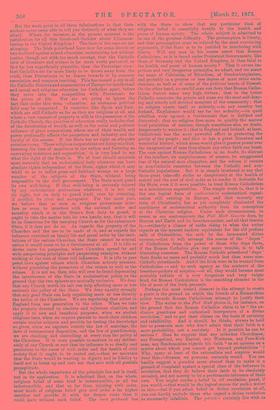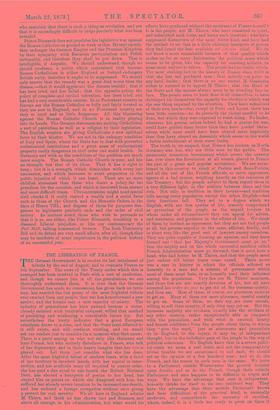ULTRAMONTANISM AT HOME AND ABROAD.
THERE is something a little humiliating in the spectacle of the alarm displayed by Teutonic and British politicians at the strategy of the feeble old man who, after denouncing modern civilisation in the Syllabus, has persuaded the largest ecclesiastical Council ever summoned to declare his official infallibility. He has no troops at all ; he has hardly any diplomatists left ; he has not a single faithful and orthodox population in the world that is not honeycombed by secret scepticism, except, perhaps, that of the Tyrol and that of Ire- land ; he is regarded as the foe of physical science, and assuredly he distrusts vehemently the bias of men whose minds have been chiefly formed by the study of physical science ; the historians expose the frauds on which a good deal of his power has been built up ; the fourth estate, the estate of letters, is penetrated with contempt for him and his priesthood, and the sacramental assumptions with which they combat the scoffs of the world ; the wealth of the world, as well as its physical power and intellectual life, is fallen away from him ; it would take a miracle, and a miracle of a more startling kind than any which the recent chronicle of marvel boasts, to subjugate again the blunt and sturdy habits of any Protestant people to his sway ; even his faithful Irish, though they may be more devout than ever in their religious duties, are beginning to refuse the priests that deference in all other matters which is the best index of religious reverence ; and yet with all these chances against him and his priesthood, they appear to inspire such terror that Protestant Germany is convulsed with the mea- sures supposed to be necessary for crippling the Papists ; and not merely Protestant, but vehemently anti-Catholic England sees its most confident and most sceptical journals rais- ing a cry of panic, and threatening " by the Heavens above and by the Earth beneath, nay, by the breeches' pocket and all that therein is," that unless the Papists turn over a new leaf and behave themselves more modestly, they shall be forcibly put down, and their " dupes " rescued from their hands. To us this sort of language seems as feeble and contemptible as it is loud. If the Papacy be really so formid- able that in countries which have thrown it off for centuries, and where the whole system of the State has been organised without any relation to it, it is impossible to hold our ground against it without laws which are not needed to restrain the professors of any other religion, it is hard to believe that we are really on the side of the truth, and fighting a religion of false, though arrogant pretensions.'
But the weak point in all these fulminations is that their authors never seem able to tell you distinctly of what they are afraid. Where, for instance, at the present moment is the justification for all this blood-and-thunder about Ultramon- tanism in the United Kingdom ? The facts of the case are not alarming. The Irish priesthood have now for some decade or two declared against mixed education, maintaining not without justice, though not with too much courage, that the Catholic view of literature and science is far more easily perverted, in fact far less superficially plausible, than the Protestant view ; that Catholics are far more likely to be drawn away from the truth, than Protestants to be drawn towards it by common association and common teaching. This has caused a cry in all the Catholic districts and communities of Europe for intellectual and moral and religious education for Catholics apart, before they enter into the competition with Protestants for the prizes of life. Nor are we going to ignore the fact that ander this term education,' an enormous political field may be comprised. In countries like Spain and Italy, which are still Catholic so far as they are religions at all, and where a vast amount of property is still in the possession of the Catholic Church, the question of education really includes that of the distribution of wealth, as well as the social and political influence of great corporations, whose use of their wealth and power profoundly affects the pauperism and industry and the loyalty of the masses. If the State has no right on adequate occasion to say, These religious corporations are doing mischief, lowering the tone of manliness in the nation, and fostering an enervating indolence and superstition,' it is very hard to say what the right of the State is. We at least should maintain most earnestly that no ecclesiastical body whatever can have absolute rights independent of the State, rights which it may wield so as to inflict gross and habitual wrongs on a large number of the subjects of the State, without being responsible to the civil government. The State must guard its own well-being. If that well-being is seriously injured by any ecclesiastical pretensions whatever, it is not only its right, but its duty to guard itself, even by attacking, if needful, its rival and antagonist. For the most part, we believe that as soon as religious pretensions inter- fere or seem to interfere with the outward order and morality which it is the State's first duty to guard, it ought to take the matter into its own hands, nay, that it will be as disastrous for the usurping Church as for the submissive State, if it does not do so. As regards the property of the Churches and the use to be made of it, and as regards the influence exercised on family life and social order by the insti- tutions of the various Churches, the State cannot be neutral unless it would cease to be a Government at all. It is idle to devise cures for pauperism, where Churches spread far and wide pauperising principles and pauperising examples, without striking at the root of those evil influences. It ie idle to pass penal laws against crimes which Churches actively promote, without punishing the promoters of the crimes as well as the crimes. It is not we, then, who will ever be found deprecating the interference of the State in ecclesiastical policy on the ground that the two spheres are mutually exclusive. We deny that any Church worth its salt can help affecting more or less seriously the policy of the State. We deny equally strongly that any good State can help regulating more or leas directly the action of the Churches. We are regulating that action in England from one generation to the other. When we take the property devoted to obsolete and injurious charities, and apply it to new and beneficial purposes, when we abolish religious tests, when we require parents to teach their children certain secular subjects and provide for testing the knowledge so given, when we regulate strictly the law of marriage, the laws of testamentary disposition, and the law of guardianship, we are checking and controlling at every step the policy of the Churches. If it were possible to-morrow to say deliber- ately of any Church or sect that its influence is so deadly and pernicious to the cause of civil order and the health of civil society that it ought to be rooted out,—then we maintain that the State would be wanting in dignity and in fidelity to itself not to break up and root out that sect with all possible promptitude.
But the whole importance of the principle lies not in itself, but in its application. It is admitted that, on the whole, religious belief of some kind is indestructible, or all but indestructible, and that so far from injuring civil order, most kinds of religious belief give civil order a far higher sanction and provide it with far deeper roots than it could have without such belief. The onus probandi lies
with the State to show that any particular kind of religious belief is essentially hostile to the health and peace of human society. The whole subject is admitted to be one of the greatest difficulty. The presumption is liberty, and that presumption must be refuted by the most convincing arguments, if the State is to be justified in interfering with liberty. Will any man in his senses assert that Roman Catholicism, as it is found under Protestant Governments, like those of Germany and the United Kingdom, is thus fatal to the health and peace of human society ? That it covers im- perious and very dangerous principles, we admit, and we assert the same of Calvinism, of Ritualism, of Swedenborgianism, and probably in a greater or less degree of most other secta- rianisms, as well as of some of the political tenets of Dissent. On the other hand, no candid man can deny that Roman Catho- licism fosters some very high virtues ; that in the better Catholic countries the priests and nuns are the most self-deny- ing and utterly self-devoted members of the community ; that no religion exerts itself so ardently,—in any country but Ireland, Englishmen would say far too ardently,—to quell rebellion even against a Government that is disliked and distrusted ; that no religion does more to qualify the narrow local patriotism of nations, though sometimes also, no doubt, dangerously to weaken it ; that in England and Ireland, at least, Catholicism has the most powerful effect in protecting the purity of the people ; and that it has a great literature and wonderful history, which alone would give it greater power over the imaginations of men than almost any other faith can boast. The case against Roman Catholicism is, no doubt, its distrust of the intellect, its suspiciousness of science, its exaggerated fear of the natural man altogether, and the schism it creates in non-Catholic countries between the Catholic and non- Catholic populations. But it is simply irrational to say that these great take-offs strike so dangerously at the health of society and the root of civil order as to render it desirable for the State, even if it were possible, to treat Roman Catholicism as a mischievous superstition. The simple truth is, that it is the one logical form of authoritative ecclesiastical organi- sation still existing in Europe, and that scarcely any form of Christianity has as yet completely eliminated the machinery of ecclesiastical authority from its conception of the Christian religion. Under such circumstances, to swear, as our contemporary the Pall Mall Gazette does, by Heaven and Earth and its breeches-pocket, and all that therein is,—evidently a climax of oaths rising to what the writer regards as the nearest modern equivalent for the old profane oath of Odsbodikins, the oath by the incarnated divine essence,—that it will attempt the rescue of the " dupes " of Catholicism from the power of those who dupe them, if the Roman Catholics give any more trouble, is to talk blustering nonsense. The Roman Catholic priesthood ' dupe ' their flocks no more and probably much less than some non- Catholic priesthoods. And if the Irish were to be weaned from Catholicism — and by such agency as the contents of the breeches-pockets of sceptics,—at all, they would become most probably infidels of a very dangerous and very vulgar kind, for Roman Catholicism is the ennobling element in the life of most of the Irish peasants.
Perhaps the most absurd element in the attempt to create a panic is the ground on which the friends of a Bismarckian policy towards Roman Catholicism attempt to justify their view. The writer in the Pall Mall places it, for instance, on the ground that the Roman Catholics claim to be " the ex- clusive guardians and authorised interpreters of a divine revelation," and to put their claims on the basis of certainty and infallibility. And it should, he thinks, always be held fair to persecute men who don't admit that their faith is a mere probability, not a certainty. Is it possible he can be serious ? Does he suppose that any orthodox Churchman, any Evangelical, any Baptist, any Wesleyan, any Free Kirk man, any Sancleraanian regards his faith " as an opinion on a matter about which you cannot get beyond probabilities " ? Why, many at least of the rationalists and sceptics would deny this,*Strauss, we presume, certainly would. You can hardly suggest a paradox more absurd than to make it a ground of complaint against a special class of the believers in revelation, that they do believe their faith to be absolutely revealed, and not merely to be a problematic inference of their own. You might render a belief in all revelation penal, if you would,—that would be the logical course for such a writer as this,—but if you admit belief in divine revelation at all, you can hardly exclude those who regard a divine revelation as necessarily infallible. The paradox certainly lies with us who maintain that there is such a thing as revelation, and yet that it is exceedingly difficult to judge precisely what has been revealed.
Prince Bismarck does not proclaim his legislative war against the Roman Catholics on ground so weak as this. He says openly, they endanger the German Empire and the Prussian Kingdom by their sympathy with Bavarian particularism and Polish nationality, and therefore they shall be put down. That is intelligible, if despotic. We should understand, though we should condemn, a policy which maintained that because Roman Catholicism in either England or Ireland endangers British unity, therefore it ought to be suppressed. We should only answer that the remedy was a great deal worse than the disease,—that it would aggravate the disease tenfold ; that it has been tried, and has failed ; that the opposite policy, the policy of complete and cordial toleration, has been tried, and has had a very considerable success. In no Protestant country in Europe are the Roman Catholics so fully and fairly treated as they are now in England, and in no Protestant country are they so loyal and so little dangerous. All this blustering against the Roman Catholic Church is in reality playing into its hands. The German statesmen are making Catholicism a sort of patriotism as well as a religion by their legislation. The English sceptics are giving Catholicism a new spiritual force by their bluster. We are not in the unhappy condition of Italy and Spain, where the State has to deal with perverted ecclesiastical institutions and a great mass of ecclesiastical property really dangerous to civil order and social health. In Germany and with us the conditions of the problem are much more simple. The Roman Catholic Church is poor, and has no strength but that of its ideas. That it has a right to keep ; but it is a strength which diminishes with every just concession, and which increases in exact proportion to the public injustice of which it can boast. There are no more childish statesmen than those who desire a policy far too grandiose for the occasion, and which is borrowed from sterner and more difficult times. Ultramontanism might need special civil checks if it could control a wealth and a social force such as those of the Church and the Monastic Orders in the days of Henry VIII., and dispose of them for purposes dan- gerous to legitimate patriotic ends and the order of civil society. As matters stand, those who wish to persuade us that it is ao, are either, like Prince Bismarck, truckling to a diseased Liberal prejudice, or like our contemporary the Pall Mall, talking nonsensical bounce. The Irish University Bill and its defeat are very small affairs, after all, though they may be incidents of some importance in the political history of an uneventful year.




































 Previous page
Previous page